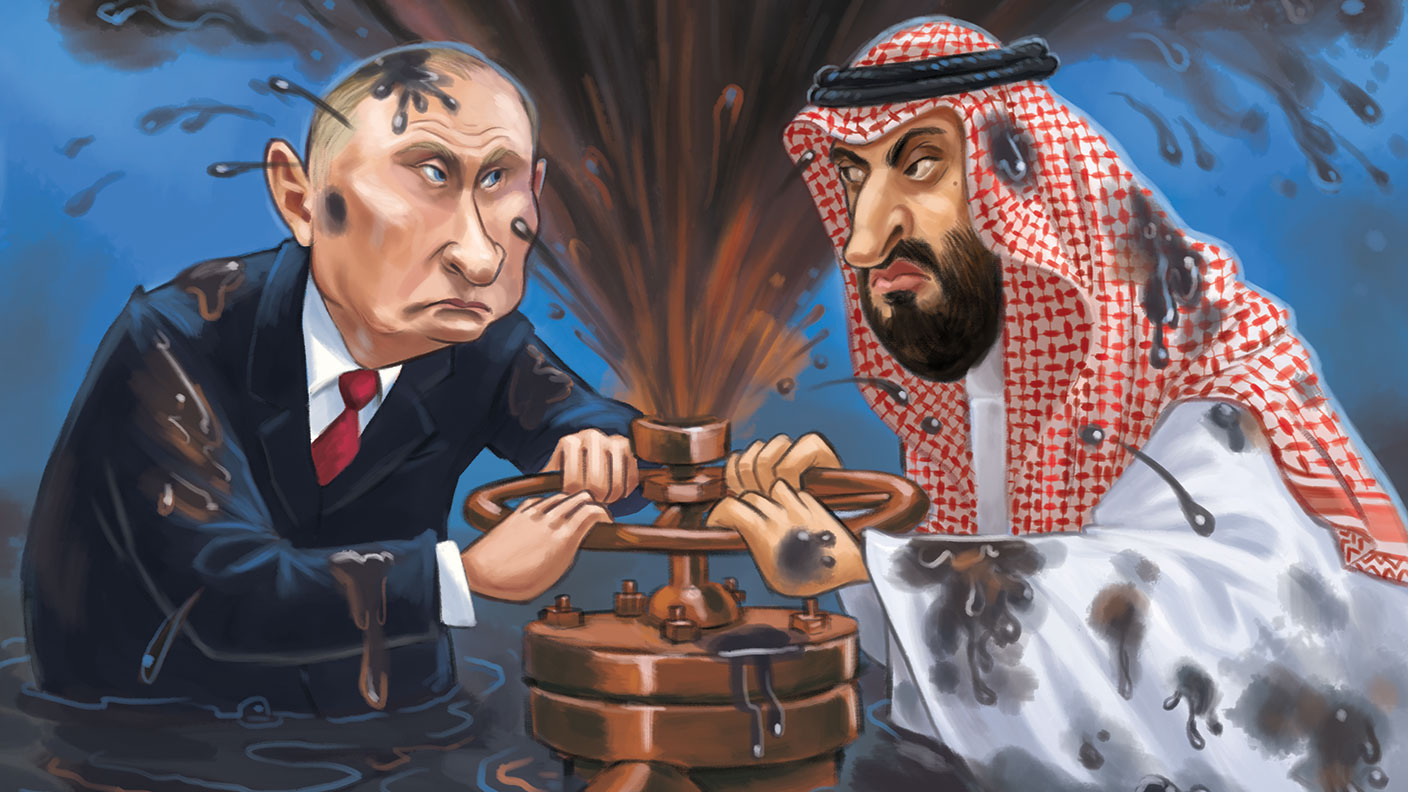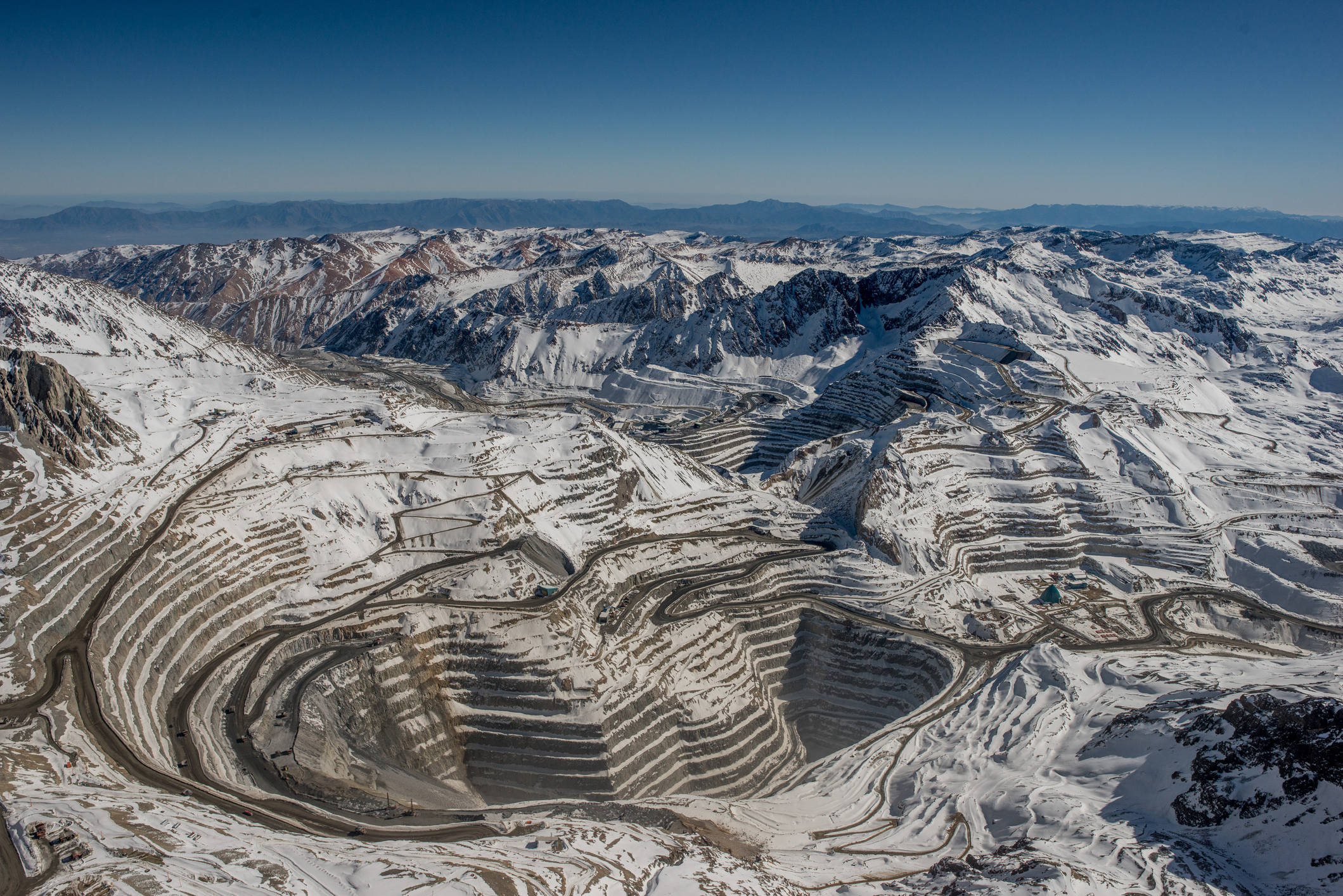Will an oil price war spark a global crisis?
The oil price suffered its biggest fall since the 1991 Gulf War after Saudi Arabia and Russia decided to bump up production at a time of reduced demand. Will there be more serious consequences?

Get the latest financial news, insights and expert analysis from our award-winning MoneyWeek team, to help you understand what really matters when it comes to your finances.
You are now subscribed
Your newsletter sign-up was successful
Want to add more newsletters?

Twice daily
MoneyWeek
Get the latest financial news, insights and expert analysis from our award-winning MoneyWeek team, to help you understand what really matters when it comes to your finances.

Four times a week
Look After My Bills
Sign up to our free money-saving newsletter, filled with the latest news and expert advice to help you find the best tips and deals for managing your bills. Start saving today!
“Now comes the oil shock,” says The Wall Street Journal. A “game of chicken between Riyadh and Moscow” has sent oil prices plunging and produced the worst day for many equity indices since 2008. Major oil producers led by the Saudis and the Russians, a grouping known as “Opec+”, have been cooperating to limit output and support crude prices since 2016. The Covid-19 demand slump saw Opec propose a new 1.5 million barrels per day (bpd) cut. That plan was rejected by Moscow, which has grown critical of an approach that it says only props up prices for US shale producers.
A nasty break-up
Rather than compromise, Riyadh retaliated. The Saudis slashed prices over the weekend in an all-out attempt to steal market share. The resulting “price war” could see the global market saturated with oil. Caroline Bain of Capital Economics predicts a “huge” global surplus of 3.2 million bpd in the second quarter.
The dramatic dissolution of the Opec+ alliance saw crude prices plunge by the most since the 1991 Gulf War on Monday. Brent crude fell 24% and is down almost 50% this year to trade at around $35 per barrel. US benchmark West Texas Intermediate had its second-worst day on record, losing 24.6%. Oil companies account for 10% of the UK equity market. The FTSE 100 had its worst day since the financial crisis on Monday, plunging 7.7%.
MoneyWeek
Subscribe to MoneyWeek today and get your first six magazine issues absolutely FREE

Sign up to Money Morning
Don't miss the latest investment and personal finances news, market analysis, plus money-saving tips with our free twice-daily newsletter
Don't miss the latest investment and personal finances news, market analysis, plus money-saving tips with our free twice-daily newsletter
The International Energy Agency forecasts that demand will fall by 90,000 bpd this year, the first annual decline since 2009, says Andy Critchlow in The Daily Telegraph. Industry veterans fret that the “high-stakes game of roulette” between Moscow and Riyadh could see oil “tumble below $20” per barrel. The Saudis do not seem well-placed to win a price war: they need prices at $80 a barrel to balance their budget. Russia, with a more diversified economy, says it only needs $40.
The downsides of cheap oil
This high-stakes strategy is typical of Crown Prince Mohammed bin Salman, Saudi Arabia’s de facto leader, writes Julian Lee on Bloomberg. The prince wants to “drive oil prices down so far and so fast that Russia realises it made a terrible mistake”, but that is unlikely to work. As with the prince’s bloody intervention in Yemen, a supposedly short decisive blow could turn into a protracted conflict that does damage to all sides. The prince is “a risk taker... prone to impulsive decisions”, Greg Brew of Southern Methodist University told The New York Times.
Yet why is cheaper oil bad news? Historically, lower prices have been seen as a “net positive for global demand” as they boost consumer purchasing power and lower costs for businesses, says Jennifer McKeown of Capital Economics. Yet with coronavirus causing lockdowns and sowing fear, consumers are unlikely to rush out to spend. Oil-producing companies and nations are in for a serious budget squeeze. “What’s more, the price crash could put severe financial stress on the corporate bond market.”
Is the corporate credit bubble about to meet its pin?
The bill for America’s energy boom could now be due. Shale energy firms have borrowed billions of dollars over the past decade to finance the exploration and drilling of thousands of wells, says Ryan Dezember in The Wall Street Journal. In a world of ultra-low interest rates investors were delighted to snap up the higher yields on offer.
Moody’s Investors Service reports that North American oil and gas firms have $200bn in debt maturing over the next four years. And now slumping oil prices are sending jitters through the bond market. On Monday energy bonds issued by smaller operators traded so low that the market seemed to have concluded they were “already out of money”. Around 12% of the $936bn of debt issued by US oil and gas firms are trading at distressed levels, notes Joe Rennison in the Financial Times: their yield is more than 10% above that of US Treasuries.
This story is bigger than US energy, says Alexandra Scaggs in Barron’s. Energy bonds make up about 11% of the US high yield debt market. Energy sector ructions have prompted investors to pull a net $9.3bn from junk bond funds over the last two weeks. That is driving up borrowing costs for all junk bond issuers. The spread of financial contagion to the wider high-yield bond market looks “inevitable”, said Deutsche Bank in a note.
Firms grappling with record levels of corporate debt could now be hit by falling earnings caused by Covid-19 on the one hand and rising borrowing costs as bond markets take fright on the other. The OECD notes that BBB-rated bonds, one notch away from junk, made up 52% of all new investment-grade bond finance worldwide over the past three years, says Philip Aldrick in The Times. Junk bonds comprise another quarter of corporate debt. What’s more, the International Monetary Fund said late last year that the money owed by companies unable to cover interest payments with profits could hit 40% of the total in eight major economies if there is a downturn half as bad as the financial crisis.
In short, concludes Aldrick, we could be in trouble. US economist Hyman Minsky argued that a fall in one set of asset prices can act like a domino that knocks over “the whole debt-funded capitalist edifice”. Corporate debt could prove the “first domino.”
What oil’s plunge means for investors
The collapse in the oil price has wrought havoc on the share prices of oil companies everywhere – with double-digit drops in the share prices of FTSE 100 stalwarts BP and Royal Dutch Shell, and the spreads on US shale oil companies debt exploding higher. So what does it mean for your portfolio?
The first question is: will the oil price stay here, or perhaps fall further? This depends on several factors, none of which look especially promising for oil bulls. On the demand side, coronavirus will have a huge impact. The International Energy Agency reckons that global oil demand will fall this year for the first time since 2009. On the supply side, Saudi Arabia and Russia have flung the taps open, with Saudi upping the stakes even further mid-week, by saying it aims to pump 13 million barrels a day – a record level. The hope might be to put US shale producers out of business, but that will take time, especially if the US steps in to defend the sector. So in the short-to-medium term, it does look as though low prices are here to stay.
But what does this mean for oil producers? It’s certainly not good news, but on the other hand, oil producers were already being shunned by global markets. As a proportion of the S&P 500 for example, the energy sector has never before been this lowly valued. Part of that is scepticism over shale producers ever making any money (quite possibly justified) but some of it is arguably down to over-optimism on how rapidly we’ll replace fossil fuels with less polluting resources. So oil companies were dropping from low valuations.
The outlook for US shale producers looks too uncertain for our liking. But the oil majors look more interesting. As Rupert Hargreaves notes on Motley Fool, BP (LSE: BP) has a healthy balance sheet with low borrowing and plenty of scope for cutting spending if necessary. The majors have also demonstrated in past crises (such as the 2014 slump in the oil price) that maintaining their dividends is of utmost importance. With BP currently yielding more than 9%, that looks worth betting on. Shell (LSE: RDSB) has a higher breakeven cost of production but it’s also viewed as unlikely to cut its dividend.
Meanwhile, a slump in the oil price is unequivocally good for some sectors and countries – cheap petrol is good news for consumers and it’s very good news for the beleaguered travel industry in general. The difficulty is that low oil prices are unlikely to benefit the latter immediately – it’s still not clear just how badly damaged airlines and cruise companies will be by the slump. If you are feeling very brave you might want to consider a small dip into cruise giant Carnival (LSE: CCL). It’s currently yielding more than 9% – we wouldn’t bet on that being paid out, but given that the US government has been making noises about assisting the travel industry, it might be worth a bet.
Get the latest financial news, insights and expert analysis from our award-winning MoneyWeek team, to help you understand what really matters when it comes to your finances.
Alex is an investment writer who has been contributing to MoneyWeek since 2015. He has been the magazine’s markets editor since 2019.
Alex has a passion for demystifying the often arcane world of finance for a general readership. While financial media tends to focus compulsively on the latest trend, the best opportunities can lie forgotten elsewhere.
He is especially interested in European equities – where his fluent French helps him to cover the continent’s largest bourse – and emerging markets, where his experience living in Beijing, and conversational Chinese, prove useful.
Hailing from Leeds, he studied Philosophy, Politics and Economics at the University of Oxford. He also holds a Master of Public Health from the University of Manchester.
-
 Early signs of the AI apocalypse?
Early signs of the AI apocalypse?Uncertainty is rife as investors question what the impact of AI will be.
-
 Reach for the stars to boost Britain's space industry
Reach for the stars to boost Britain's space industryopinion We can’t afford to neglect Britain's space industry. Unfortunately, the government is taking completely the wrong approach, says Matthew Lynn
-
 Is the market missing the opportunity in energy?
Is the market missing the opportunity in energy? -
 Halifax: House price slump continues as prices slide for the sixth consecutive month
Halifax: House price slump continues as prices slide for the sixth consecutive monthUK house prices fell again in September as buyers returned, but the slowdown was not as fast as anticipated, latest Halifax data shows. Where are house prices falling the most?
-
 Rents hit a record high - but is the opportunity for buy-to-let investors still strong?
Rents hit a record high - but is the opportunity for buy-to-let investors still strong?UK rent prices have hit a record high with the average hitting over £1,200 a month says Rightmove. Are there still opportunities in buy-to-let?
-
 Pension savers turn to gold investments
Pension savers turn to gold investmentsInvestors are racing to buy gold to protect their pensions from a stock market correction and high inflation, experts say
-
 6 stocks to buy to invest in Latin America
6 stocks to buy to invest in Latin AmericaThe region is the world’s one-stop shop, boasting the raw materials required for the energy transition and key foodstuffs to cater for growing populations, says James McKeigue. Here’s how to profit.
-
 Where to find the best returns from student accommodation
Where to find the best returns from student accommodationStudent accommodation can be a lucrative investment if you know where to look.
-
 The world’s best bargain stocks
The world’s best bargain stocksSearching for bargain stocks with Alec Cutler of the Orbis Global Balanced Fund, who tells Andrew Van Sickle which sectors are being overlooked.
-
 Revealed: the cheapest cities to own a home in Britain
Revealed: the cheapest cities to own a home in BritainNew research reveals the cheapest cities to own a home, taking account of mortgage payments, utility bills and council tax